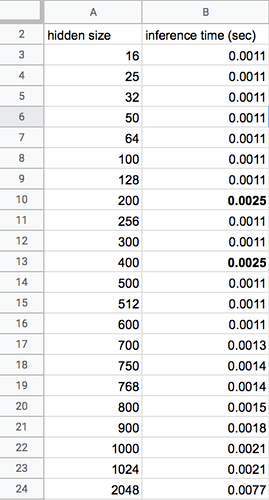I was experimenting the GPU inference time using different sizes of LSTM. It turns out that when the LSTM hidden size is 200 and 400, the inference time is extremely slow (even much slower than hidden size =700). Below are the code and the relationship between hidden_size and average_sequence_inference_time (in seconds).
Other info:
GPU: 1 RTX2070
torch version: 1.6.0
Eval setting: only 1 example per batch.
import torch
import numpy as np
import time
import torch.nn as nn
class LSTMDummy(nn.Module):
def __init__(self, embedding_size, input_size, hidden_size,
n_layers, dropout_p):
super(LSTMDummy, self).__init__()
self.embedding = nn.Embedding(embedding_size, input_size)
self.lstm = nn.LSTM(input_size, hidden_size,
num_layers=n_layers,
dropout=dropout_p,
bidirectional=True,
batch_first=True)
def forward(self, tensor):
torch.cuda.synchronize()
start_time = time.time()
lstm_input = self.embedding(tensor)
output = self.lstm(lstm_input)
torch.cuda.synchronize()
end_time = time.time()
return end_time - start_time
class CheckGPUTensorMul:
device = torch.device("cuda:0")
n_exp = 10000
sizes = [16, 25, 32, 50, 64, 100, 128, 200, 256, 300, 400, 500, 512, 600, 700, 750, 768, 800, 900, 1000, 1024, 2048]
sizes2 = [200, 750]
@classmethod
def calculate_time_lstm(cls):
n_vocab = 10000
seq_len = 20
input_tensors = [torch.tensor([[np.random.randint(0, n_vocab)] * seq_len], dtype=torch.int64).to(cls.device)
for i in range(cls.n_exp)] # n_exp = 10,000
for size in cls.sizes: # 16, 32, 50, 64 ...
time_list = []
lstm_model = LSTMDummy(
embedding_size=n_vocab,
input_size=100,
hidden_size=size,
n_layers=1,
dropout_p=0.0
)
lstm_model.to(cls.device)
lstm_model.eval()
# Warm up
for input_tensor in input_tensors[:100]:
time_ = lstm_model(input_tensor)
for input_tensor in input_tensors:
time_ = lstm_model(input_tensor)
time_list.append(time_)
print("=" * 40)
print("size:", size)
print("avg time:", sum(time_list)/len(time_list))
